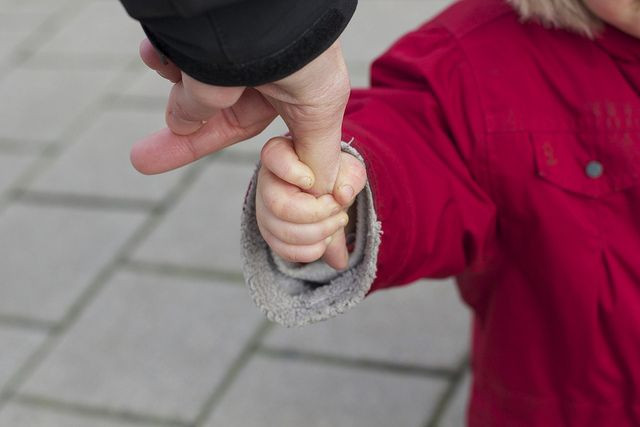Regardless Of Income, Moms And Dads Worry Their Kids Will Be Bullied Or Struggle With Anxiety

The dividing line between American families has more to do with economics than parenting style, according to a new Pew Research Center report. In some respects, though, American parents share the same concerns. Regardless of income, many people worry their children will be bullied or someday struggle with anxiety or depression.
The report is based on a survey conducted between September 15 and October 13 among 1,807 parents with children younger than 18. The well-known Pew Research Center commonly describes itself as a "fact tank" that informs the public about the issues, attitudes, and trends shaping America and the world. For this particular survey, Pew wanted to understand the fundamental challenges faced by parents today. To accomplish this, the research team began by examining the family environment.
Income Differences
Financial well-being relates strongly to living arrangements, suggests Pew. Their analysis of 2014 Census Bureau data indicates 62 percent of children younger than 18 lived in a household with two married parents, while 7 percent lived with unmarried cohabitating parents, and 26 percent lived with one parent. Breaking the numbers down further, Pew finds 31 percent of black children, 55 percent of Hispanic children, 72 percent of white children, and 82 percent of Asian-American children live with two married parents.
According to Pew, one in 10 children who live with married parents faces poverty (official poverty levels by state can be found here), compared to slightly more than two in 10 children (21 percent) who live with cohabiting parents, and slightly more than 3 in 10 children (31 percent) who live in single-parent households.
As might be expected, lower income parents are more likely to rate their neighborhoods negatively than higher income parents, according to Pew. Those who face poverty also expressed greater concern about their children becoming victims of violence, yet, surprisingly, they are not alone.
Violence
Fifty-nine percent of parents with family incomes below $30,000 reported they worry their child or children might be kidnapped, 55 percent said they felt concerned about getting beat up or attacked, while 47 percent indicated worries about their children getting shot. By comparison, fewer parents with incomes above $75,000 reported feeling concern, but the percentages are still high: 44 percent indicate worries about kidnapping, 38 percent about attacks, and 22 percent about getting shot.
Lower income parents also feel challenged when seeking affordable, high-quality after-school programs for their children. Slightly more than half of those with total family incomes below $30,000 say these programs are hard to find in their community, which compares to 29 percent of those with incomes of $75,000 or higher. Regarding extracurricular activities, higher income parents also appear to be at an advantage compared to their lower income peers. Wealthier parents reported 84 percent of their children participated in sports, the scouts, music lessons, dance classes, or art activities during the 12 months prior to the survey. Comparatively, 59 percent of lower income parents said the same.
While differences between income levels are clear, the great equalizers appear in the form of three issues: teen pregnancy, bullying, and mental health.
Half of the lower income parents worried about teen pregnancy (both a girl becoming pregnant or a boy getting a girl pregnant) compared with 43 percent of higher income parents. Nearly identical portions of parents in all income groups worried their children might be bullied or struggle with anxiety or depression at some point. In fact, for parents with annual family incomes greater than $75,000, Pew found these concerns trumped all others included in the survey. In some respects, then, all American parents are quite the same.



























